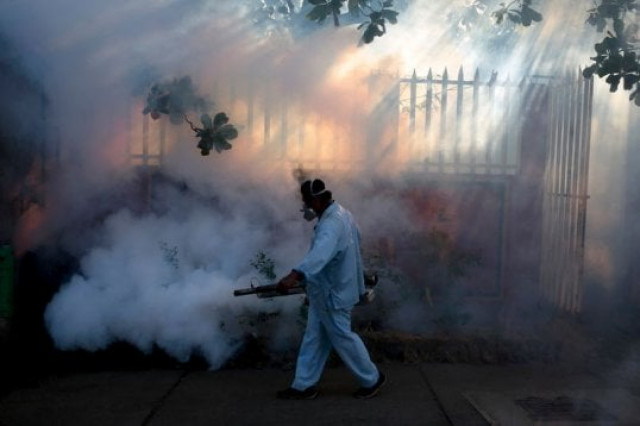Spreading awareness: ‘Prevention is the best defence’
Dr Bushra Jamil speaks on outbreak of Chikungunya and how to prevent infections

PHOTO: REUTERS
She was delivering a lecture at a public awareness seminar titled 'The Recent Outbreak of Chikungunya in Pakistan' on Friday at the Dr Panjwani Centre for Molecular Medicine and Drug Research (PCMD), International Centre for Chemical and Biological Sciences, University of Karachi. The seminar was jointly organised by PCMD and the Virtual Education Project Pakistan.
Dr Jamil said that while the virus is not new to Pakistan, it exists with very low-level activity. The only way to prevent it is to prevent mosquito bites, she said, adding that prevention is better than any cure.
Our neighbouring country, India, faced a significant outbreak of chikungunya in 2005 and 2006, while in 2007 dozens of cases of chikungunya were reported in Pakistan, she said, adding that the virus has so far affected around 60 countries in Africa and Asia.
Talking about signs and symptoms of the disease, she said that symptoms are generally self-limiting, last for two or three days and appear between four and seven days after the patient has been bitten by the infected mosquito. These symptoms include high fever, joint pain in the lower back, ankles, knees, wrists or phalanges, joint swelling, rash, headaches, muscle pain, nausea and fatigue, said Dr Jamil.
There are some health complications linked with this disease such as eye problems, heart attacks, hepatitis, kidney problems, skin issues and bleeding, she explained.
She also added that socioeconomic burden is also associated with this kind of disease, which affects the productivity of patients even after being cured. Talking about treatment, Dr Jamil said that there is no specific antiviral drug treatment for chikungunya and vaccines are not used as preventive measures as they are not available on a commercial scale. What we can do is focus on prevention and control of the disease, she said. This includes reducing the number of natural and artificial water-filled container habitats that facilitate breeding of mosquitoes, she said.
Ending her lecture, Dr Jamil suggested an awareness programme be initiated that can help people prevent such disease and teach them about eliminating mosquito breeding grounds.
Published in The Express Tribune, February 4th, 2017.



















COMMENTS
Comments are moderated and generally will be posted if they are on-topic and not abusive.
For more information, please see our Comments FAQ